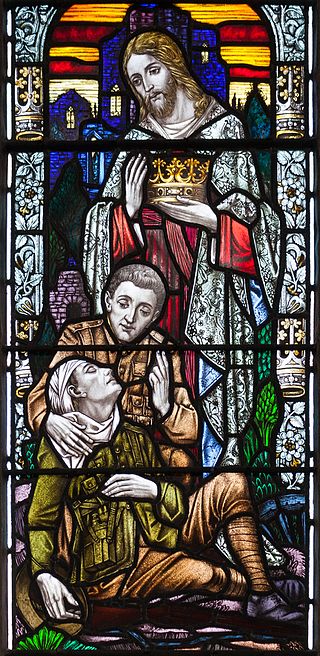Top Qs
Timeline
Chat
Perspective
Five crowns
Concept in Christian theology From Wikipedia, the free encyclopedia
Remove ads
The Five Crowns, also known as the Five Heavenly Crowns, is a concept in Christian theology that pertains to various biblical references to the righteous's eventual reception of a crown after the Last Judgment.[2] Proponents of this concept interpret these passages as specifying five separate crowns, these being the Crown of Life; the Incorruptible Crown; the Crown of Righteousness; the Crown of Glory; and the Crown of Exultation.[2] In the Greek language, stephanos (στέφανος) is the word for crown and is translated as such in the Bible, especially in versions descending from the King James Version.[3] These five rewards can be earned by believers, according to the New Testament, as "rewards for faithfulness in this life".[4]

Remove ads
Crown of Life

The Crown of Life, also called the Martyr's Crown, is referred to in James 1:12 and Revelation 2:10; it is bestowed upon "those who persevere under trials."[5][6] Jesus references this crown when he tells the Church in Smyrna to "not be afraid of what you are about to suffer... Be faithful even to the point of death, and I will give you the crown of life."[7]
Remove ads
Incorruptible Crown
The Incorruptible Crown is also known as the Imperishable Crown, and is referenced in 1 Corinthians 9:25.[2] This epistle, written by Paul of Tarsus, deems this crown "imperishable" in order "to contrast it with the temporal awards Paul's contemporaries pursued".[8] It is therefore given to those individuals who demonstrate "self-denial and perseverance".[8]
Crown of Righteousness
The Crown of Righteousness is mentioned in 2 Timothy 4:8,[2] and is promised to "those who love and anticipate" the Second Coming of Christ.[9] These Christians desire intimacy with God.[10]
Crown of Glory

The Crown of Glory is discussed in 1 Peter 5:4 and is granted to Christian clergy, who "shepherd the flock in unselfish love being a good example to others" 1 Peter 5:2–4.[11][12]
Crown of Rejoicing
The Crown of Rejoicing is also known as the Crown of Exultation, or Crown of Auxiliary.[2] Delineated in 1 Thessalonians 2:19 and Philippians 4:1, it is given to people who engage in evangelism of those outside the Christian Church.[13] In the New Testament, Paul earns this crown after winning the Thessalonians to faith in Jesus.[14]
See also
References
External links
Wikiwand - on
Seamless Wikipedia browsing. On steroids.
Remove ads
